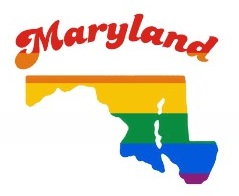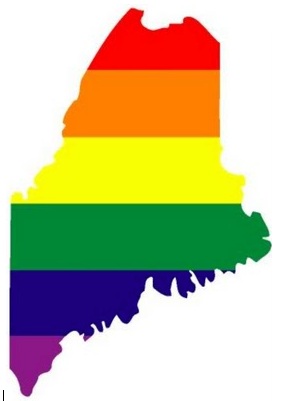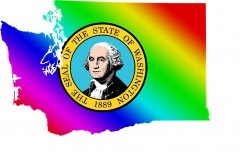As November draws near, we’re starting to focus more on the nitty-gritty details that are going on the ballots in states where same-sex marriage is up for debate. Yesterday the Washington Post reported that there is “good gay-marriage ballot language in Maryland,” and went on to explain why: both the title and the language of the referendum are very straightforward, and Josh Levin, campaign manager for Marylanders for Marriage Equality, told the Post that if people understand the referendum is about “equality and religious liberty,” it will be sure to get more support.
 Maryland’s ballot language will be as follows:
Maryland’s ballot language will be as follows:
“Establishes that Maryland’s civil marriage laws allow gay and lesbian couples to obtain a civil marriage license, provided they are not otherwise prohibited from marrying; protects clergy from having to perform any particular marriage ceremony in violation of their religious beliefs; affirms that each religious faith has exclusive control over its own theological doctrine regarding who may marry within that faith; and provides that religious organizations and certain related entities are not required to provide goods, services, or benefits to an individual related to the celebration or promotion of marriage in violation of their religious beliefs.”
Back in May with North Carolina’s devastating passage of Amendment One, we saw how unclear language on a ballot can obscure the issues that people are really voting on. While the ballot language asked voters to decide whether marriage should only be validated if it’s between a man and a woman, it actually also banned domestic partnerships (both between same-sex couples and straight couples), which wasn’t clearly stated.
The North Carolina ballot read:
“Constitutional amendment to provide that marriage between one man and one woman is the only domestic legal union that shall be valid or recognized in this State.”
Precisely because of cases like North Carolina, it’s important and uplifting to see such straight-forward language on some upcoming ballots.
 Maine and Washington will also be using promising language.
Maine and Washington will also be using promising language.
Maine will ask its voters an incredibly simple, straight-forward question: “Do you want to allow the State of Maine to issue marriage licenses to same-sex couples?”
Washington echoes Maryland on several counts, including preserving the right of clergy to refuse to perform or accommodate any wedding ceremonies with which they do not feel comfortable.
The specific language of the Washington ballot will be:
 “This bill allows same-sex couples to marry, applies marriage laws without regard to gender, and specifies that laws using gender-specific terms like husband and wife include same-sex spouses. After 2014, existing domestic partnership are converted to marriages, except for seniors. It preserves the right of clergy or religious organizations to refuse to perform or recognize any marriage or accommodate wedding ceremonies. The bill does not affect licensing of religious organizations providing adoption, foster-care, or child-placement.”
“This bill allows same-sex couples to marry, applies marriage laws without regard to gender, and specifies that laws using gender-specific terms like husband and wife include same-sex spouses. After 2014, existing domestic partnership are converted to marriages, except for seniors. It preserves the right of clergy or religious organizations to refuse to perform or recognize any marriage or accommodate wedding ceremonies. The bill does not affect licensing of religious organizations providing adoption, foster-care, or child-placement.”
Along with Maryland, Maine and Washington, Minnesota is the fourth state that will be voting on same-sex marriage in November. The language of the Minnesota ballot echoes North Carolina in that it is a proposed ban, rather than a proposed approval.
The language of the Minnesota ban reads:
 “Shall the Minnesota Constitution be amended to provide that only a union of one man and one woman shall be valid or recognized as a marriage in Minnesota?”
“Shall the Minnesota Constitution be amended to provide that only a union of one man and one woman shall be valid or recognized as a marriage in Minnesota?”
However, the Minnesota differs from North Carolina in a big way: while North Carolina tacitly opposed civil unions (but did not state as much in the language), Minnesota will actually leave room for civil unions, even if the amendment passes (though it does not explicitly say so in the language). It has been argued that the legislators who proposed the amendment actually purposely made it more focused on marriage this time around (rather than including civil unions) because the general public has become more sympathetic to the idea of civil unions for same sex couples. Tom Prichard, the executive director of the Minnesota Family Council and a key amendment backer, did not acknowledge this theory: rather, he said the plan is just to “zero in” on marriage, the Star Tribune reported last August.
What will all this language mean come November? We’ll have to wait and find out.





























